Join our mailing list
Select articles from recent issues of the AYA Oncology e-News, published by the Victorian Adolescent & Young Adult Cancer Service (ONTrac at Peter Mac).
December 2023
Unpacking the Australian Cancer Plan
The Australian Cancer Plan (ACP) was launched in November this year and has been created to improve cancer outcomes and experiences for all Australians. With a strong focus on equitable cancer care- particularly for those whose health outcomes are poorest- the ACP provides a template for national focus across six strategic objectives, with two- and five-year goals and actions. 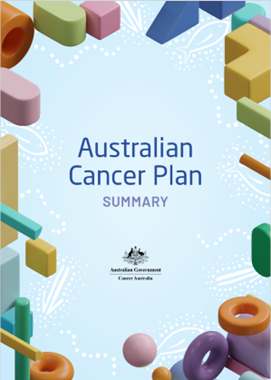
Adolescents and young adults are highlighted as one of the groups for which disparities exist, with a specific section in the ACP dedicated to young people. Beyond describing important differences in the care of this population and highlighting key reference documents such as the AYA optimal care pathway, the ACP identifies AYA-specific actions across a range of areas, including early detection, improving experience, providing optimal care and growing the sector’s capacity for care delivery. Actions to promote more equitable outcomes for young people are both short- and long-term and include:
- Improve understanding of why AYA cancers occur, including the implementation of risk-based population screening measures for those who are at elevated risk (e.g. genetic risk, lifestyle behaviours and environmental factors)
- Integration of a multi-channel, multi-disciplined navigation model across the cancer continuum to ensure young people, their families and carers have the right support at the right time
- Improve availability of AYA-specific, co-designed and tailored information and resources
- Align care delivery to the relevant tumour stream and AYA optimal care pathway
- Develop integrated care models to access high quality, AYA-specific palliative and end-of-life care
- Improve targeted and innovative research with a focus on fertility outcomes and clinical trial access
- Build capacity and capability across future cancer and primary care workforces to ensure high quality AYA care delivery
- A focus on achieving equity for Aboriginal and Torres Strait Islanders, with particular recognition of the compounding impacts of intersectionality for AYA identifying across multiple diverse groups and priority populations
Although the targets are ambitious, many of these actions align with existing and planned initiatives at the local and national level that will have a tangible effect in improving the outcomes and experience of young people and their families, with opportunities for the Victorian AYA community to take the lead in their development.
Australian Cancer Plan | AYA-specific content
September 2023
Wear it Purple Day was enthusiastically celebrated by the Victorian AYA Cancer Team and many other health services on Friday 25 August in honour of a shared commitment to fostering supportive, safe, empowering and inclusive environments for rainbow young people.
DID YOU KNOW? When asked about their service preferences:
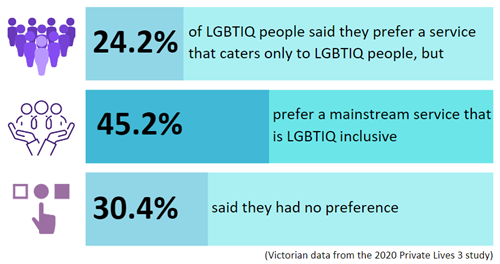
See below for practice resources, patient resources and referrals, professional development opportunities and more to help you and your service on your own LGBTIQA+ inclusivity journey.
Practice resources:
Patient resources and referrals:
Professional development and training:
- Rainbow Health Australia
Introductory online course and other training options for health and community services
- Zoe Belle Gender Collective
DHHS-funded, specialist training packages for different types of health services that can be tailored to all ages or youth specifically.
- Queerspace
Tailored training on a range of topics
Data and research:
The biennial Global AYA Cancer Congress is the largest and most significant gathering of the international AYA cancer community. This year’s Congress was held in June 2023 in sunny Long Beach California and themed Real World AYA Cancer Care: Progress and Opportunities. 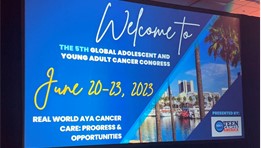
A common theme this year was disparities in AYA outcomes and care, powerfully reinforced by the keynote presentation delivered by science writer and author Rebecca Skloot. She highlighted the racial and ethical inequities embedded in our healthcare system through the story of Henrietta Lacks, the woman behind the immortal HeLa cells. Henrietta was a young African American woman diagnosed with cervical cancer in 1951 whose cells were taken and shared widely for research without her knowledge or consent- as was common practice at the time- both prior to her death and in the many decades since. Rebecca spent years researching her 2010 book The Immortal Life of Henrietta Lacks, including interviewing Henrietta’s family who spoke of the trauma of being told their mother’s cells were still alive, which they understood to mean their mother was still alive, in a prison cell. It was a powerful call-to-action on themes of injustice, inequity, health literacy and informed consent as we seek ways to improve the outcomes and care of our own AYA patients.
“If you’re not at the table, you’re on the menu”: the criticality, power and value of meaningful consumer engagement
Undoubtedly the most impactful perspectives we heard across the three days (based on the extended standing ovation they received) were those of young people themselves. In a standout plenary session Marginalized and Minoritized: Disparities and Unequal Treatment in AYA Oncology, co-chairs Christabel Cheung (University of Maryland) and Michael Roth (University of Texas MD Anderson Cancer Centre) demonstrated the power of authentic collaboration with patient advocates with embodied knowledge and a call to action to all clinicians and researchers to prioritise these relationships. Their invitation to AYA advocates to ask difficult questions about challenges within the healthcare sector which exacerbate disparities was genuine and far from tokenistic and left us all with no doubt that harnessing embodied knowledge of survivor advocates is essential to creating meaningful change. Court Simmons spoke powerfully about the impact of living with Li-Fraumeni syndrome, his multiple cancer diagnoses, and living as a transgender individual. He implored us to listen with openness and humility, and to be willing to sit with discomfort and to learn.
A focus on data and outcomes for young people: is what we’re doing making a difference?
Data relating to the changing profile/incidence of various cancers in the AYA cohort, disparities in developing countries and epidemiological and other outcomes featured prominently in this year’s conference. There was a general sense from some Australian attendees of the data presented across a number of areas reinforcing what we know and see in practice.
“This slide is hard” said AnnaLynn Williams (University of Rochester Medical Centre), acknowledging those with lived experience in the room when presenting her 2021 paper Rethinking Success in Pediatric and Adolescent Cancer: Beyond the 5 Year Survival. In speaking about excess deaths in young people diagnosed ages 15-19, AnnaLynn noted, “We really haven’t made much improvement in this specific demographic group. And when we add in deaths occurring 10 or more years from diagnosis, the total number of excess deaths is actually increasing over time.” A provocative statement highlighting that the 5-year overall survival rate commonly used as the primary benchmark of success does not accurately reflect the prevalence of late onset toxicities associated with receiving treatment at a young age, or the many decades of extended life post diagnosis.
AYA cancer care in Australia: a reputation for excellence
Youth cancer services and research in Australia are very well-regarded amongst our international peers. The Australian representation at this year’s conference was also notable, with attendance by staff from all jurisdictions and several dozen presentations and posters on diverse topics highlighting our place at the forefront of AYA cancer care innovation.
“The onset of cancer in an adolescent or young adult not only affects who they are, but also who they become.” ~David Wright, TYAC nurse, Manchester UK 2013
Attending this conference was a powerful reminder of all the work, research, talent and continual improvement that goes into AYA cancer care, and how we must continue to recognise that each individual young person brings their own constellation of history, relationships and priorities. They are so much more than their diagnosis, and each story, struggle, and triumph shapes their outlook on life and how they manage the demands of treatment and life beyond. As clinicians, it is our responsibility to create a safe space where these young people feel valued and understood and receive the absolute best care, regardless of location, demographics or barriers.
Mark your calendars- the next Global AYA Cancer Congress will be in Melbourne in December 2024! Sign up here to receive updates.
February 2023
Fertility is one of the most critical domains for consideration in AYA cancer care. It is well-documented as a key area of concern for young people themselves,1,2 with a lack of fertility information linked to reduced mental health and quality of life in young people with cancer.3,4 In recent years fertility and its preservation in the AYA and broader cancer context has been the focus of numerous guidelines, resources and education interventions,5,6,7,8 and yet due to both patient- and provider-related barriers, estimates suggest that less than 50% of eligible cancer patients know or are told about options for preserving fertility.9 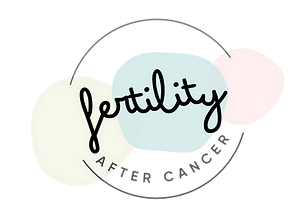
Fertility After Cancer is a new patient education website launched by the Western and Central Melbourne Integrated Cancer Service that aims to help bridge this gap. Developed in direct response to the newly updated COSA guidelines on fertility preservation, the site offers videos and other resources to support and inform fertility-related discussions and decision-making, including explanations of various preservation options and broader discussions around the importance of onco-fertility. Videos are also available with Arabic, Greek, Italian, Mandarin and Vietnamese translations.
Additional resources for patients:
Additional resources for clinicians:
September 2022
International data demonstrate a strong correlation between clinical trial participation and improved cancer survival. The low rates of clinical trial enrolment observed in AYA is considered a key contributor to the reduced survival gains of this group as compared to older and younger cancer populations.
The barriers for clinical trial accrual in AYA have been well articulated but often focus on conceptual models rather than practical implementation and system modifications that improve AYA trial access. In 2018, the Victorian Comprehensive Cancer Centre (VCCC) established a two-year program of work to understand local barriers to AYA trial access, with the aim of developing targeted solutions that lead to greater AYA clinical trial participation. The program combined expertise in paediatric, AYA and adult oncology, human research ethics and governance, clinical trials and consumer experience to conduct a comprehensive review of barriers to AYA trial participation in Victoria and develop the following outputs in response to three key themes (Ethics and Governance Awareness, Access and Availability):
-
A guide for investigators on how to establish a clinical trial open to participants both over and under the age of 18 (research ethics and governance guidelines)
-
Standard Operating Procedure and access request form to assist paediatric hospital staff in securing young adult access to their clinical trials
-
Guidance on how to facilitate the inclusion of adolescents aged 12-17 on adult oncology clinical trials (for investigators, review boards and pharmaceutical companies)
-
A guide to establishing paediatric-adult oncology partnerships
This work is already being applied in settings across Victoria, with potential for translation nationally. For more information on preliminary impacts and to access the above resources visit the VCCC Alliance AYA toolkit and its corresponding publication.
The Clinical Oncology Society of Australia (COSA) has recently launched its updated guidelines for fertility preservation for people with cancer, incorporating evidence for children, adolescents and young adults (AYAs) and adults of reproductive age that have been diagnosed with cancer. They provide evidence-based and consensus-based recommendations to assist health professionals in discussing and managing fertility preservation for people with cancer, including:
-
The potential impact of cancer treatments on fertility
-
Referral pathways and oncofertility service provision
-
Fertility preservation options for people diagnosed with cancer
Adolescent & Young Adult Optimal Care Pathway (AYA OCP) - coming soon
The Adolescent & Young Adult Optimal Care Pathway is a joint initiative between the Paediatric Integrated Cancer Service (PICS) and the Victorian Adolescent & Young Adult Cancer Service (ONTrac at Peter Mac). It is a framework for the delivery of consistent, safe, high-quality and evidence-based care for young people with cancer. The AYA OCP has been designed to complement the existing cancer-specific OCPs to ensure that current, emerging and future developmentally significant health issues for young people are addressed in conjunction with their cancer treatment. Development has been guided by a national expert working group consisting of national leaders in oncology and adolescent health and is underpinned by strong engagement and consultation with young people and community partners. The final document is due to be launched in the coming months.
A comprehensive list of current Australian and international guidelines of relevance to AYA oncology and cancer care is maintained on the Victorian AYA Cancer Service’s website.
Sleep difficulties are common in AYA with cancer and can significantly impact upon quality of life. Up to 50% of young people with cancer report sleep disturbance and insomnia during and/or after treatment, with excessive daytime sleepiness and napping, broken sleep, and problems initiating or remaining asleep the most frequently reported issues. Sleep difficulties in AYA have been associated with school and work challenges, deficits in social skills and cognition and emotional regulation difficulties, as well as higher rates of depression, anxiety and posttraumatic stress disorder.
Contributing factors:
Young people are at greater risk for sleep difficulties than older and younger cancer populations, due in part to biological and behavioural life stage factors. Natural changes in circadian rhythm and common AYA lifestyle factors (e.g. evening activities and consumption habits, early morning school/work commitments) often result in later bedtimes and shorter sleep duration. Cancer can further exacerbate the problem with sleep disruptions caused by hospital admissions, medications (e.g. steroids), physical symptoms (e.g. pain) and treatment-related side effects. Impacts to sleep may continue (or arise) post-treatment due to the range of physical, emotional and practical stressors many young people experience during this period.
Treatment options:
Cognitive behavioural therapy (CBT) is recommended as first-line treatment and has been proven effective in treating sleep difficulties, with results that are safer (e.g. no physical side effects) and more sustainable compared to short-term pharmacological treatments. CBT can include any number or combination of psychoeducational, behavioural and cognitive components, tailored to individual needs and circumstances. It is well-suited to AYA as it can also help address other co-morbid issues highly prevalent within this age group, such as fatigue and anxiety.
With access to traditional CBT support by a trained psychologist or counsellor often limited, self-management resources have been shown to be an effective and acceptable alternative for the treatment of sleep difficulties.
Approaches for AYA:
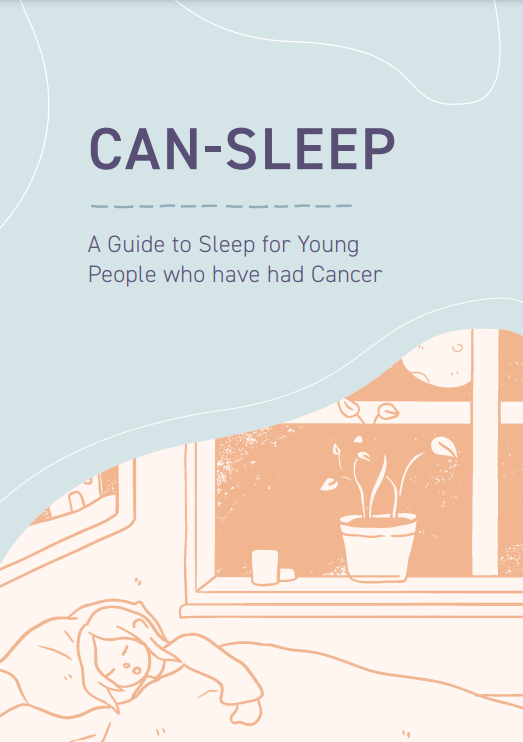 AYA Can-Sleep is an evidence-informed model for identifying and addressing sleep difficulties in young people with cancer that takes a stepped care approach to screening, provision of and coaching around a purposely designed self-management booklet, and individualised psychology-led CBT. An evaluation of this model is currently under review. Health professionals working with AYA experiencing sleep difficulties may wish to attend an upcoming webinar on AYA Can-Sleep and multidisciplinary applications of the strategies on which it is based.
AYA Can-Sleep is an evidence-informed model for identifying and addressing sleep difficulties in young people with cancer that takes a stepped care approach to screening, provision of and coaching around a purposely designed self-management booklet, and individualised psychology-led CBT. An evaluation of this model is currently under review. Health professionals working with AYA experiencing sleep difficulties may wish to attend an upcoming webinar on AYA Can-Sleep and multidisciplinary applications of the strategies on which it is based.
Practice points:
- Sleep issues are very common in AYA during and post-treatment- consider screening for sleep difficulties as part of routine practice to assess the presence of symptoms and risk factors.
-
While traditional CBT is the ideal first line treatment for insomnia, self-management CBT resources are also effective, particularly if combined with psychoeducation- the AYA Can-Sleep guide may be provided as a resource to young people and assist in clinical discussions (available early October 2022); Insight Timer is a popular app that uses guided meditations, music and talks to help with sleep, relaxation and mindfulness.
References:
- Zhou ES, Recklitis CJ. Internet-delivered insomnia intervention improves sleep and quality of life for adolescent and young adult cancer survivors. Pediatr Blood Cancer. 2020 Sep;67(9):e28506.
- Zhou ES, Vrooman LM, Manley PE, Crabtree VM, Recklitis CJ. Adapted delivery of cognitive-behavioral treatment for insomnia in adolescent and young adult cancer survivors: a pilot study. Behav Sleep Med. 2017 Jul-Aug;15(4):288–301.
- Vaughan E, Ftanou M, Lewin J, Murnane A, Berger I, Wiley JF, et al. AYA 'Can-Sleep' programme: protocol for a stepped-care, cognitive behavioural therapy-based approach to the management of sleep difficulties in adolescents and young adults with cancer. Pilot Feasibility Stud. 2022 Jul;8(1):159.
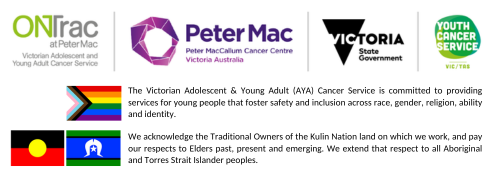







 AYA Can-Sleep is an
AYA Can-Sleep is an